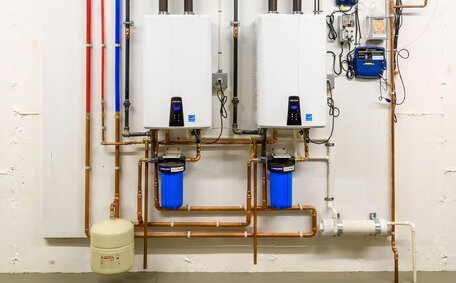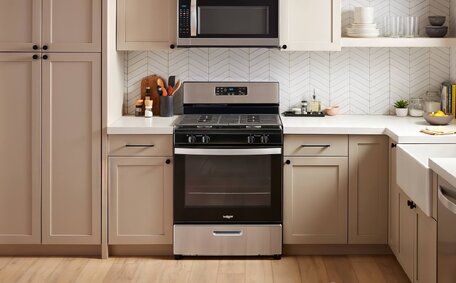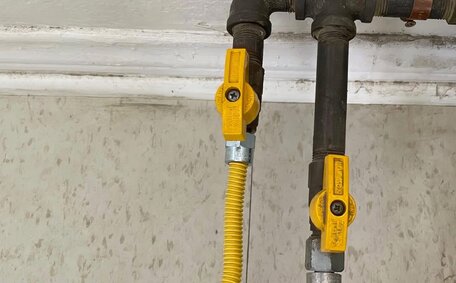
How Hard Water Hurts Hot Water Heaters
Hard water leaves mineral deposits in heaters, pipes and tanks. This limescale reduces efficiency, lifespan and hot water availability. Contact us for affordable water softening solutions.
Read MoreA blocked sink drain can disrupt your daily routine with unpleasant consequences. Standing water, foul odours, and backed up pipes are inconvenient at best and health hazards at worst. Preventing blockages is crucial for maintaining well-functioning drains and plumbing.
This article explores how to prevent blocked sinks, drawing on Picnic Point Plumbing’s expertise in tackling common drain blockage challenges. From experience clearing thousands of drain blockages, we’ve learned the most common causes and simple tips homeowners can follow to stop clogs before they start.
In this introductory guide, we’ll overview some of the top techniques for keeping drains free-flowing. Practical steps such as using disposals carefully and clearing debris with baking soda and vinegar can actively protect your sinks from blockages.
Establishing good drain care habits and avoiding common clogging culprits is essential for maintaining clear drains and smooth plumbing operations over time. Read on for DIY tips to prevent sink clogs and maintain a flowing drainage system throughout your home.
Employing a drain strainer is a simple precaution that can stop food scraps, hair, and other debris that may cause blocked drains before it enters your drainage system. Drain strainers act as barriers inside the drain to capture food scraps, hair, and other particles, preventing them from accumulating in your pipes.
It’s highly recommended to use a basket strainer for kitchen sinks.
The deep basket design efficiently captures all manners of food waste, safeguarding the drain pipe from unwanted blockages in your house. For easy cleaning, remove the strainer basket from the sink trap to prevent debris from entering your drainage system when you dispose of it. For bathrooms, utilise a hair-catching drain stopper to trap drain hair before it has the chance to create a clog further in the plumbing.
No matter the type of drain strainer, it’s essential to clean your chosen solution regularly. Allowing debris to accumulate in the strainer basket defeats the purpose of catching particles before they enter the drainage system.
Installing strainers is an effective and affordable way to protect your drains and hot water system from clogs. Pair strainer baskets with other smart habits like avoiding pouring fats down the sink, and you’ll prevent blocked drains, saving yourself from annoying and costly plumbing repairs.
One of the most common causes of a kitchen drain becoming blocked is pouring grease, oil and fat residues from cooking down your kitchen sink, with grease oil being particularly problematic. Over time, cooling fats congeal and coat the inside of drain pipes, eventually leading to severe blockages that restrict water flow.
To prevent grease-related clogs, avoid pouring used cooking oil down the toilet or sink. After cooking, allow the fat oil to solidify and then scrape it directly into the garbage rather than risking it setting within your drains.
Just as you would dispose of toilet paper and other non-flushable items properly, used cooking oil and grease residues should also be collected, stored in a sealed container, and disposed of correctly. A kitchen hack is to wipe down oily pans with paper towels and throw them directly into the bin before washing, reducing residual oil in your drains that leads to blockages.
Our experts at Picnic Point Plumbing have extensive experience in clearing drains that have been clogged by years of grease and fat disposal.
Excess food waste going down the drain is a primary cause of blocked kitchen sink drains. Vegetable peels, egg shells, tea leaves, coffee grounds, and other food scraps quickly accumulate and can cause clogs.
To prevent food-related blockages, avoid using your sink as a waste disposal unit. Scrape plates and dispose of all food scraps into the trash or compost before washing dishes to prevent them from going down drain. For small particles that do slip down the drain, use a sink strainer to catch them before they complicate your plumbing.
Take care not to overload it when using garbage disposal. Limit use to small amounts of soft waste.
Avoid bulky scraps like corncobs, husks, and greasy foods, which can jam the disposal. Run plenty of cold water while operating the disposal to send water down your drain and ensure particles are flushed through the system.
With some mindful habits at the sink and proper use of your garbage disposal if you have one, you can keep food debris from building up in pipes. This small change prevents so many avoidable clogs!
Bathroom sinks and the shower drain are prone to getting clogged with hair and debris washed down during use. As strands of hair wash down the drain, they can catch other particles and quickly snowball into a mass that blocks water flow.
To avoid hair-related clogs, make it a habit to regularly remove accumulated hair, which can easily lead to blockages, from bathroom drains. Once a week, use a zip-it drain cleaning tool to extract hair and debris.
Alternatively, A bent wire hanger or drain snake can work too, effortlessly pulling out your stubborn clogs with ease.
For extra preventive care, we all need to pour some hot water down occasionally and use a strainer to cover the floor drains to catch hair before it enters the pipes. Taking a few minutes each week to manually remove hair will keep your bathroom drains clear and running smoothly.
Using boiling water can be an effective way to help flush out and prevent blockages in your sink and shower drains.
To tackle potential drain issues, begin by boiling a pot of water on the stove. Wait 5-10 minutes for the boiling water to take effect before running your shower or tap as usual.
Repeat this boiling water treatment weekly or monthly as part of your regular drain maintenance, which you can do effortlessly. It helps scour pipes and prevent gradual build-up over time. Just take care when using boiling hot water in pipes made of PVC, as the high temperatures can potentially damage your pipes.
Along with strainers and mindful use of drains, flushing with boiling water is a simple, natural way to keep your plumbing clear and working properly. Consistent drain care is one of the most beneficial things you can practice to help avoid blockages and ensure water systems keep functioning properly.
Using natural household products such as baking soda and vinegar, along with boiling water, is an eco-friendly and cost-effective way to clear clogs and maintain open drains. Bicarb soda, a household staple, performs admirably when it comes to dislodging minor blockages and keeping pipes free of grime buildup.
A combination of baking soda and vinegar creates a chemical reaction that can dissolve clogs, grime, grease, and soap scum. In place of disposing coffee grinds down the sink, opt for a monthly maintenance treatment with a potent combination of a half cup of baking soda, a cup of vinegar, and hot water.
The fizzing and bubbling action from this mixture helps dislodge and flush away grime.
For stubborn clogs, pour one cup of baking soda down the sink and let it sit for several hours to help break up the obstruction. Follow up by pouring a pot of boiling water down the drain to wash up clog causing debris away. Baking soda helps dissolve grease, and flushing with hot water afterwards helps clear the obstruction.
Vinegar can also be used alone as a weekly cleaner, helping remove buildup and keep pipes clear. Remember, just as cat litter shouldn’t go down the toilet, boiling water is your ally! A weekly flush with boiling water helps to prevent the accumulation of soap, oil, and hair.
Take advantage of these natural cleaning methods and save the drain cleaner for harsher blockages. A routine of baking soda, vinegar, and boiling water keeps pipes clean and promotes the free flow of water throughout the plumbing system.
Plungers and plumbing snakes are useful tools for clearing minor clogs yourself before they become major blockages. Learning proper techniques for using them can help in resolving issues quickly and effectively.
Position the plunger to create a seal over the drain, then use quick up-and-down motions to plunge vigorously several times.
This mechanism uses pressure to draw water into the pipe and dislodge the blockage.
For deeper clogs further down the pipe, a drain snake is more effective. Feed the flexible metal snake down the pipes and rotate to grab hair and debris. Slowly retrieve the snake and observe the ensnared material come out, unwinding itself free as you pull.
Excessive force with any such tool can damage your pipes, which is why gentle action can take place. If DIY efforts don’t resolve the issue, it may be time to call a professional plumbing service. But starting with a plunger or snake provides a simple, affordable at-home remedy for many minor clogs.
Our licensed plumbers use high-tech cameras to thoroughly inspect your drain pipes, identifying any blockages early and ensuring nothing unsuitable causes further obstructions.
Such extensive checks are designed to uncover any buildup, detect cracks akin to those from a burst pipe, spot tree roots intrusions or other hidden issues. If we discover any concerning issues, we can provide expert repair or maintenance advice to enhance drainage and extend your plumbing’s lifespan, much like our services on the Gold Coast.
An ounce of prevention is certainly better than a pound of cure when it comes to drains. Minor buildup that is cleared preventatively costs only a fraction of a full pipe replacement down the line. Our professional maintenance addresses issues before they escalate.
Along with inspections, Picnic Point Plumbing offers affordable annual drain cleaning packages. Our potent hydro jetting machinery can unblock your pipes thoroughly, excising grease, soap scum, and various other types of debris effectively. This prevents gradual accumulation that can eventually cause major backups.
Don’t wait for an emergency to focus on your drainage concerns.
Keep your drains and plumbing running optimally for decades to come with proactive, preventative maintenance.
While many minor drain issues can be prevented or resolved yourself using the tips in this article, certain situations clearly warrant calling in a professional plumber. If you try the recommended home remedies and DIY methods but your drains remain slow or completely clogged, it’s time to get expert help.
Here are some sure signs you need to contact Picnic Point Plumbing for prompt assistance with your blocked drain:
We would highly recommend our emergency plumbing services, available 24/7, to promptly alleviate any sewer backups or health hazards.
Our clients are very happy to feedback that our team did an excellent job with drain inspections, hydro jetting, pipe repairs, or resolving any other plumbing challenges. Contact us online, book an appointment, or call 1300 349 338 to speak with our friendly, knowledgable staff.
Hard water leaves mineral deposits in heaters, pipes and tanks. This limescale reduces efficiency, lifespan and hot water availability. Contact us for affordable water softening solutions.
Read MoreIt’s important to routinely check your gas appliances for any issues. Signs of problems include gas leaks, strange sounds, odd smells and more. Have a professional inspect your gas appliances annually and service them regularly for safety.
Read MoreUpgrading your gas meter is a simple process completed by registered technicians. It involves disconnecting your gas supply for 15 minutes to swap the old meter for a new digital smart meter. The upgrade is free and improves accuracy.
Read MorePicnic Point, 2213 NSW
We will call back as soon as possible.




